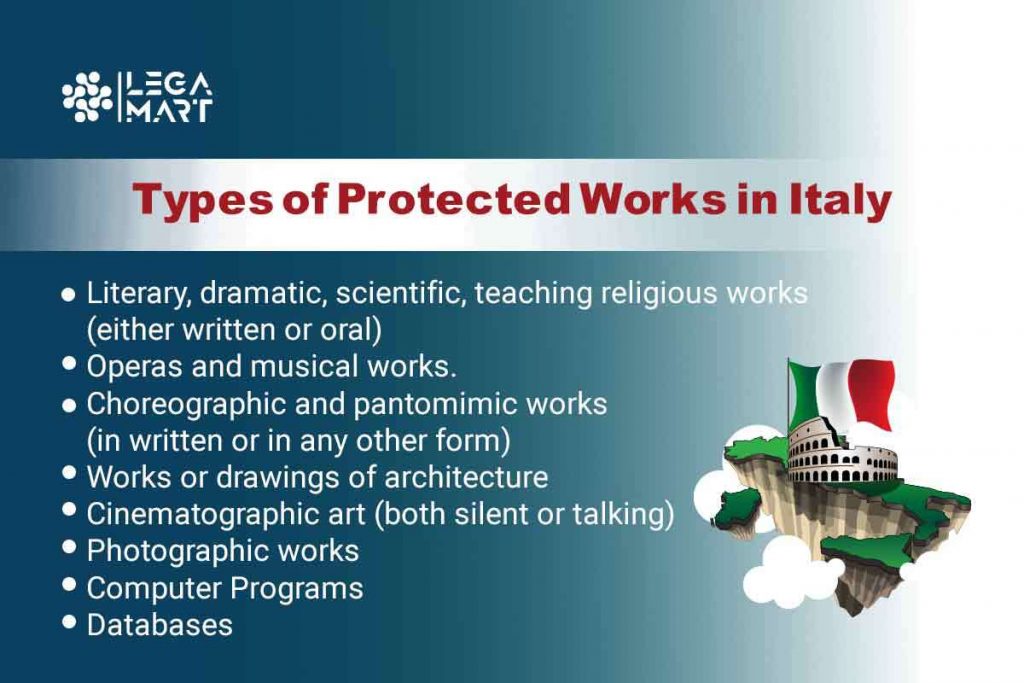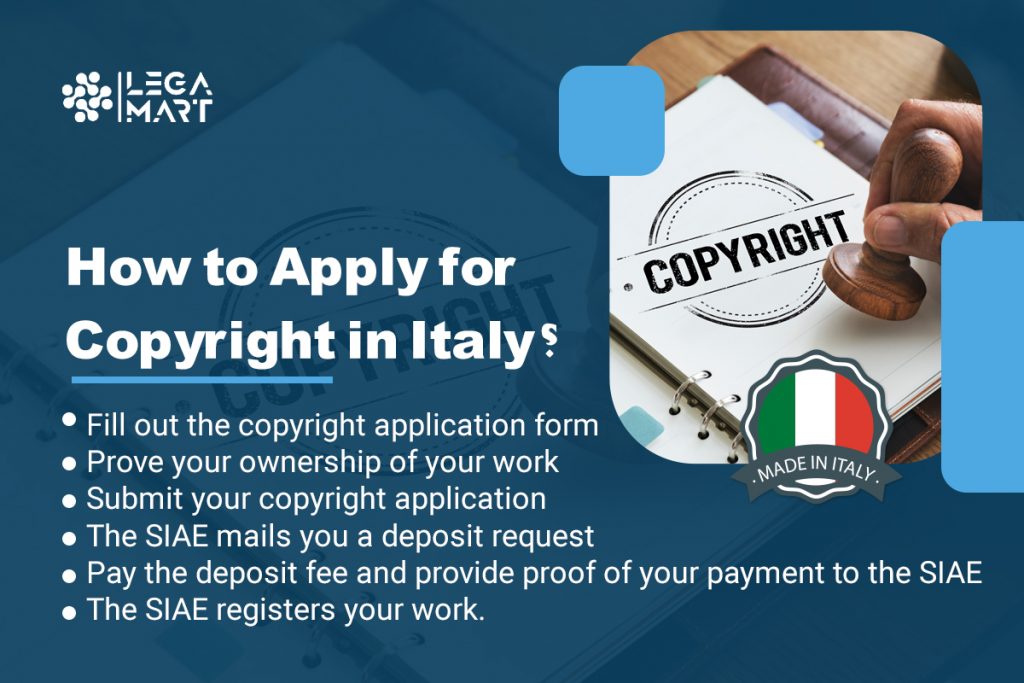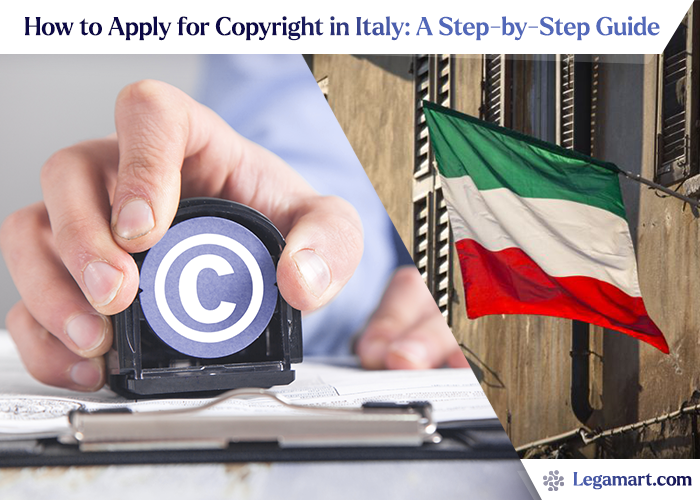- Introduction
- Domestic and International laws governing copyright in Italy
- Types of Protected Works in Italy
- Rights granted to an author by copyright
- Copyright Assignment and License in Italy
- How to Apply for Copyright in Italy?
- Duration of Copyright Protection in Italy
- What are the Benefits of Copyright Registration in Italy?
- How to Enforce Your Rights After Applying for Copyright in Italy?
- Conclusion
- Frequently Asked Questions (FAQs)
Introduction
Copyright is designed to protect the creator from unauthorised use of their work. Hence, the exclusive right to use the work rests with the creator until and unless the creators themselves want to share it in the public domain. Copyright registration is a simple, inexpensive, and effective way to access full protection for your creative work under Italian law. This national framework, often interacting with principles of Cross-Border & International Law, is designed to give creators robust protection. If you are a creator resident and want to apply for copyright in Italy and receive all the benefits of an Italian copyright registration certificate, settle down and read this article carefully.
if you want to read more about What are the Trade Restrictions in Italy? – Legamart click on the link.
Domestic and International laws governing copyright in Italy
Even though the Italian Constitution doesn’t explicitly provide for copyright protection, copyright obtains its constitutional protection from the combined provisions of Articles 2, 9, 21, 33, and 42. Copyright rules also appear in Articles 2575 and 2583 of the Italian Civil Code. However, the civil code reproduces the copyright rules in the Copyright Act 1941/633. Several amendments have been made to the Copyright Act through the approvals obtained by the international conventions and the European Union (EU) directives.
Therefore, if your work has a creative nature, it can be copyrighted in Italy. The concept of ‘creativity’, as recognised in Italy, is when the work consists of some recognisable independent skills and efforts of the author. Further, it is important for the creative work to be capable of being expressed in perceptible form and should be capable of reflecting itself in the external world.
Therefore, article 1(1) of the Copyright Law of Italy protects the literary, artistic, musical, architectural, theatrical, and cinematographic works of creative character, and Article 1(2) of the Law protects computer programs and databases. Further, a detailed list of protected works has been provided under Article 2 of the Copyright Law.
When it comes to international agreements, Italy has been a part of various international treaties and conventions on the national treatment of foreign works. These include:
- The Berne Convention for the Protection of Literary and Artistic Works
- Universal Copyright Convention (Geneva)
- Universal Copyright Convention (Paris)
- Agreement on Trade-Related Aspects of Intellectual Property Rights
- WIPO Copyright Treaty
Through these conventions, any work which has originated in Italy, or where the author of the work is a national of Italy, or if the work was first published in Italy, the work is provided with the same copyright protection in each of the Berne Convention member countries.
Types of Protected Works in Italy

The list provided in Article 2 of the Copyright Law is inclusive of the following works:
- Literary, dramatic, scientific, teaching religious works (either written or oral)
- Operas and musical works. Irrespective of whether they have words, any musical-dramatic work and the musical variation representing an original work can be copyrighted.
- Choreographic and pantomimic works (in written or in any other form)
- Works or drawings of architecture
- Cinematographic art (both silent or talking)
- Photographic works
- Computer Programs
- Databases
Creative elaborations of works, including amendments, translations, addition, adaptation, and transformations, are also protected under the law.
Rights granted to an author by copyright
The benefits provided to the author are mainly divided into 2 categories:
Rights of economic usage
These are further classified into primary rights and secondary/related rights. Primary rights are for works that are granted the complete protection of copyright, which includes the right to publish, reproduce, represent, diffuse, distribute, translate, rent, and lend the work. Related rights are ‘added’ to primary rights and have less relevance and a shorter duration. Therefore, these are specific rights provided to certain types of works and are provided on a case-to-case basis.
Moral Rights
Moral rights are the right to get recognised as the author/creator of the work, and hence, preventing anyone from modifying the work without the prior consent of the author/creator.
Copyright Assignment and License in Italy
The assignment of a copyright is the complete transfer of a certain right to the purchaser, which must be specified in the contract of assignment. A clear distinction must be made between the assignment of the work (also called ‘corpus mechanicum’) and the author’s rights on the work (also called ‘corpus mistycum’) to secure that purchaser of the work to use their images for advertising the work.
On the other hand, a license contract is when the author allows a third party to use their work for a certain period or purpose. Here, the owner still maintains complete ownership over the copyright. Once the license period has collapsed, the author obtains exclusive control over the copyright again and is hence, free to give them to someone else. The license can be exclusive or not exclusive, depending upon the agreed terms of the contract.
How to Apply for Copyright in Italy?

Globally, the copyright to your work originates from its creation. When you swipe a brush on a canvas, write a paragraph of your story or record a song demo, you own the copyright to that piece. The need for copyright application and registration stems from the legal conditions to obtain redressal when someone infringes on your copyright. This brings us to our most significant problem: how do you apply for a copyright in Italy? Here we go!
Fill out the copyright application form
You can obtain the form from the Italian society of authors and publishers (SIAE) head office in Rome or any of the SIAE local offices in Italy.
Prove your ownership of your work
Many copyright infringement disputes revolve around one question: who is the rightful owner of the work? While this issue is not your primary concern, the SIAE requires you to demonstrate that you own the work by appending your signature, your full name, and the title of your work on every page of your work (if it is printed on paper).
If your work has been created on a tangible medium, such as floppy disks, CD-ROMs, magnetic tapes, etc., write out your full name, signature, and the work title on a piece of paper and adhere it to the tangible medium with an adhesive label.
Submit your copyright application
After filling out the copyright application form, send it with a signed copy of your work to the SIAE.
The SIAE mails you a deposit request
You must comply with the request within sixty days, counting from the day it was sent to you. If you do not, the SIAE cancels the request and returns your work to you.
Pay the deposit fee and provide proof of your payment to the SIAE
Whether you paid the fees through the post office or via bank transfer, you must submit the receipt of your payment or proof of the bank transaction to the SIAE.
The SIAE registers your work
After encasing the submitted copy of your work and your statement of ownership in an envelope for safekeeping, the agency issues a certificate of copyright registration to you, which displays your filing reference number.
Duration of Copyright Protection in Italy
Through copyright, the author obtains both economic rights and moral rights over the work. Under Article 25 of the Copyright Law, the duration of copyright protection is for the entire life of the author, and it is possible for the heirs to exercise the right of copyright for 70 years after the author’s death. Once this period expires, the work becomes a part of the ‘public domain’; hence, it can be freely publishable.
However, the duration of copyright can differ in some cases, especially for works which benefit from ‘ancillary’ rights. These depend on a case-to-case basis.
What are the Benefits of Copyright Registration in Italy?
It is a public record of your ownership of the copyright
Sure, you know deep down that you’re the rightful owner of your work. You may have shared your art on social media and let your friend circle know you created it. But in the legal space, a copyright registration certificate is the only recognised public statement of the fact that you own the copyright to your work.
You will be eligible to file a copyright infringement lawsuit
When you find out that a third party is stealing and making money from your work, the last thing you want to hear from your lawyer is, “I know you’re upset about this issue, (insert your name), but you can’t sue so-and-so for infringing your copyright.” Not funny, is it?
You will be entitled to statutory damages and attorney fees
Consider the case where you win a lawsuit against the owner of the alleged copyright infringement. In that case, the court will order the defendant to pay the stipulated monetary compensation and adhere to the issued injunctions.
How to Enforce Your Rights After Applying for Copyright in Italy?
If you’re a copyright holder in Italy, you may wonder how to enforce your rights and prevent others from infringing on your work. Here are a few steps you might consider taking to protect your copyright and deter infringement.
First, you should register your work with the Italian copyright office. This will give you official proof of your ownership of the work and make it easier to enforce your rights if someone infringes on your copyright. You should also include a copyright notice with your work, indicating that it is protected by copyright law. Finally, you can issue cease and desist letters to infringers and, if necessary, file lawsuits to stop them from using your work without permission.
Exhaustion Principle of Copyright
Irrespective of whether the author has a valid copyright, once the author has put a work on sale and the same has been sold to someone else, it is impossible for the author to oppose the subsequent circulation of the work. Hence, after the first sale, it is possible for the work to be sold or gifted to third parties without the author’s consent.
In some cases, the selling of the work is legitimately permitted under the law. However, this doesn’t mean that further duplication or rental of the work is also permitted. So, if someone buys a CD of an opera work, the purchaser cannot duplicate or rent the CD to a third party since the copyright still vests with the creator of the opera piece.
Conclusion
If you’re an Italian or European Union-based designer, you should consider registering your work with the SIAE. It can give you an edge in negotiations and legal protection against competitors and clients, which can help in copyright infringement or contract termination (if you’re a freelancer). If you haven’t registered your work with the Italian copyright office yet, now might be a good time.
If you require any help with registering your copyright in Italy, the experienced team of lawyers at LegaMart is always available to answer all your questions. Find them now!
Frequently Asked Questions (FAQs)
What works can be copyrighted in Italy?
If your work has a creative nature, it can be copyrighted in Italy. Article 1(1) of the Copyright Law of Italy protects the literary, artistic, musical, architectural, theatrical, and cinematographic works of creative character, and Article 1(2) of the Law protects computer programs and databases. Further, a detailed list of protected works has been provided under Article 2 of the Copyright Law.
Which authority registers the copyright in Italy?
Your work is registered by the Society of Authors and Publishers (SIAE) in Italy.
What is the duration of copyright protection in Italy?
Under Article 25 of the Copyright Law, the duration of copyright protection is for the entire life of the author, and it is possible for the heirs to exercise the right of copyright for 70 years after the author’s death. Once this period expires, the work becomes a part of the ‘public domain’; hence, it can be freely publishable.




